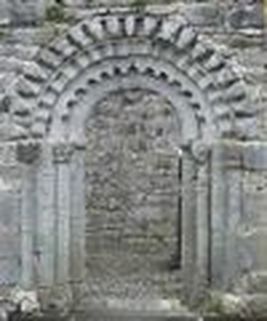 I came across some interesting advice offered by writer James Scott Bell in the Winter 2013 edition of Writer's Digest: "Create a Doorway of No Return for your protagonist before the 1/5 mark of your book." In those first few pages, Bell explains, your protagonist must be moving along a path towards a moment of transition, a threshold that once crossed over, can not be crossed back. To get to this point, the stakes must be high... The force must be strong... The protagonist must...walk...through...that door--either willingly or inevitably--and there's no turning back. Never mind that it's not really a doorway if you can't cross back and forth. Never mind that it sounds like your protagonist has entered a trap, or a jail for that matter. Like moving from the underworld, the character must not turn back, or his or her journey will not be fulfilled. This concept actually makes sense to me. This is Katniss volunteering to take her sister's place at the reaping. This is Harry Potter, accepting the invitation to Hogwarts. This is Elizabeth Bennett, walking to Netherfield Park during the rainstorm. The stakes for not entering the doorway can not be borne. In my current Work-In-Progress, my protagonist (not Lucy! This is my other WIP!) has decided to pursue a life of crime. Why did she make that choice? While I thought in the first draft I made that clear, I can see now that her path, though brambly, was not leading her to The Doorway of No Return. Which meant that the forces I had acting on her were not compelling enough. NOW, I have unleashed the hounds, and they are chasing her. And here's how I see it: My protagonist is racing down that path, stumbling, falling. The doorway is ahead, not gleaming but dark. She doesn't know what's on the other side, but it's the only chance she has...the only chance her little brother has too. She will scramble across that threshold, and once she does, she will become a criminal--with no chance of returning to her former life... But I'm so curious. As a writer or a reader, do you even pay attention to these early doorways? Do you even notice them as significant?
4 Comments
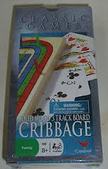 So my son recently received a cribbage game--a game I didn't know too much about but which looked fun enough. When we started to play, however, I happened to read this blurb on the packaging: "Cribbage is believed to have been invented during the 17th century by an English poet." What? Whoa! Cribbage is a 17th century game? Invented by a poet? What poet?! I had to look into this. So, of course, I typed in "History of Cribbage" into the almighty Google, and sure enough I found that "Cribbage was invented in the early 1600s by Sir John Suckling, an English courtier, poet, gamester and gambler." But since I tend not to believe what I read on the internet, I double-checked this information with the well-regarded Dictionary of National Biography. The DNB confirms the circumstantial evidence concerning the invention of the game, citing the biography of Suckling (1609-1641?), written by 17th century antiquarian John Aubrey (1626-1697) in his collection called Brief Lives. 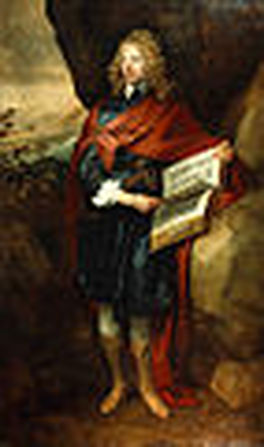 Sir John Suckling -Courtier & Cribbage Creator Aubrey portrays Suckling as quite a merrymaker, anecdotally recalling him as "the greatest gallant of his time" (287). Suckling was, too, alleged to be the "greatest gamester, both for bowling and for cards." He had such a reputation for gambling, it would seem, that "no shopkeeper would trust him for 6d, as today he might by winning, be worth 200 pounds, and the next day he might not be worth half so much" (287-291). Surprisingly, Suckling wasn't actually very good at cards...a bit of a problem for a compulsive gambler. To make up for this deficit, he would "by himself abed, and there studyed how the best way of managing the cards could be." Indeed, he figured out a variation of an existing game--Noddy--which he called "cribbage." Apparently others liked cribbage as well, and he came to make a lot of money off of his reinvention. As Aubrey tells us: "Sir John Suckling invented the game of Cribbidge. He sent his Cards to all Gameing places in the countrey, which were marked with private markes of his; he gott twenty thousand pounds by this way." However, Suckling had a weakness for "Ladies of Quality, all beauties and young." This weakness ended up costing him "many hundreds of pounds," apparently because he enjoyed lavishing them with "silk stockings, garters and gloves." (Brief Lives, 289).
Fun guy, to be sure! Suckling, however, was more than a courtier and a ladies' man. He found time to write--quite prodigiously--and demonstrated some fine insights into the larger political context of the day. All told, he wrote seventy-eight poems, four plays, a few political tracts, as well as at least fifty letters, which according to Aubrey, displayed great intelligence and a "sparkling wit." (287-291) It's actually interesting to consider Suckling's personality when you reflect on the game. After all, cribbage offers a funny balance of strategy and luck, as well as a carefree leapfrog quality. Suckling's dual love of gambling and carousing at play? Just a thought. Eventually, his bad luck at gambling and in love seem to have caught up with him. Sadly, at age 28, when faced with great financial losses, Suckling poisoned himself, "which killed him miserably with vomiting" (291). A sad end...but at least he gave us cribbage. We think. 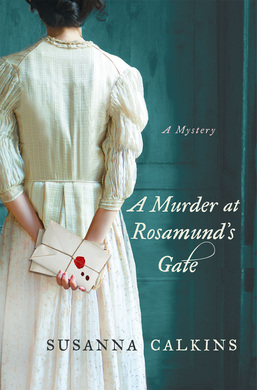 Just a hundred days left until A Murder at Rosamund's Gate is released on April 23, 2013!!! Now, I know you might well be thinking: "Um, didn't your book come out, like, a year ago? You've been talking about it for ages." Nope. The book has just been gestating, percolating, spinning, whirling, stirring for the last eighteen months. What can I say? Publishing is a mysterious business. A hundred days! A hundred days! Historically, the Hundred Day mark has been a crucial signifier:
Okay, so the last 100 days before my book gets published is not quite so significant in comparison. And I'm pretty sure that the journey won't be a "do or die" march towards triumph or defeat a la Napoleon or FDR. But given that I've been waiting my whole life for this moment... JUST A HUNDRED DAYS TO GO is an awfully exciting concept!!! Murder, Mayhem and a Midwife...An interview with historian Sam Thomas, author of The Midwife's Tale1/8/2013 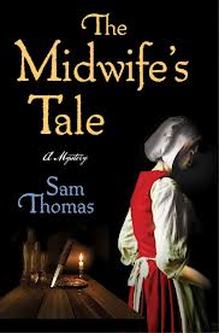 I'm excited to have historian Sam Thomas join me today to discuss his first novel, The Midwife's Tale, a historical mystery set in mid-seventeenth century York. Sam and I connected about a year ago, when we realized that (1) we're both trained as early modern English historians; (2) we both have debut novels coming out with Minotaur Books this year; and (3) both our mysteries are set in nearly the same time period. (I'm encouraging Sam to think about doing a cross-over piece, so that his midwife can bring my Lucy Campion into the world. But I digress.) -------------------------------------------------------------------------------------------------------- The Official Description: It is 1644, and Parliament’s armies have risen against the King and laid siege to the city of York. Even as the city suffers at the rebels’ hands, midwife Bridget Hodgson becomes embroiled in a different sort of rebellion. One of Bridget’s friends, Esther Cooper, has been convicted of murdering her husband and sentenced to be burnt alive. Convinced that her friend is innocent, Bridget sets out to find the real killer. Bridget joins forces with Martha Hawkins, a servant who’s far more skilled with a knife than any respectable woman ought to be. To save Esther from the stake, they must dodge rebel artillery, confront a murderous figure from Martha’s past, and capture a brutal killer who will stop at nothing to cover his tracks. The investigation takes Bridget and Martha from the homes of the city’s most powerful families to the alleyways of its poorest neighborhoods. As they delve into the life of Esther’s murdered husband, they discover that his ostentatious Puritanism hid a deeply sinister secret life, and that far too often tyranny and treason go hand in hand. -------------------------------------------------------------------------------------------------------- 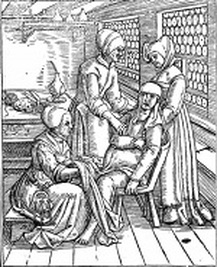 A midwife at work The Midwife's Tale is told through the first person perspective of Lady Bridget Hodgson, a 30-year old twice-widowed midwife and real historical figure. How much is known of the true Bridget, and how much of her personality/character did you invent? Did you ever feel constrained writing a fictionalized account of a real person? That’s a great question! We know a fair bit about Bridget, and I include some of it here. A lot of the basics are true: She was twice widowed, first to a man named Luke Thurgood, then to Phineas Hodgson, who was the son of the Lord Mayor of the York. (And yes, Phineas seems to have been every bit the loser I portray him as.) Bridget also had a deputy named Martha, though I had to invent much more of her background. It is also pretty clear that she was a very strong woman. She came from an ancient family and wanted people to know it. She also named all of her goddaughters (as well as her own daughter) ‘Bridget’, presumably after herself. Who does that? I did, however, make some cuts. For my first book I had a heck of a time writing her home life, so I made her childless, though the historical Bridget was survived by two daughters. There are also rumors that she had two sons, both of whom were hanged as highwaymen, which is amazing, but I’m not sure I believe it. 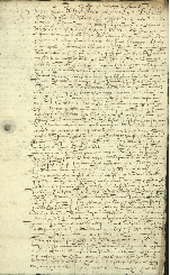 Bridget's Will Similarly, is the case at the heart of The Midwife's Tale based on a true case from the archives? How did you go about doing your research? The case itself is entirely fictional, though a lot of the supporting characters are real. As for the research it was a lot of digging. I stumbled across Bridget’s will when I was working on another project, and it provided dozens of names for me to chase down: friends, family, and best of all, godchildren, which allowed me to identify a handful of clients. Once you have names, you can then dig into baptismal registers, tax records, probate documents, legal records, histories of York…it’s endless, really. I also got very lucky that Bridget was once sued for defamation, which allowed me do dig even further into her social life and the history of her practice. Besides being a compelling read, your story gets at some of the larger historical themes around gender, politics and religion that shaped this time period. In what ways did you consciously try to illuminate these larger trends? How did you balance the need for historical accuracy with creative license? I consciously wanted to connect ‘big’ and ‘little’ history. The novel takes place in the midst of a rebellion against the king, so I made the crime at its heart a domestic rebellion in which a wife is accused of murdering her husband. This was a time when people were intensely concerned about maintaining order at the national and domestic levels, and I wanted to see how they would react when that order was challenged. (Oddly – or not – I do much the same thing in my historical work, favoring microhisotry, in which big stories are told through the lives of average individuals.) In doing your research, what was one of the most interesting things you learned? I think it was how complicated life as a midwife could be. Not only did they deliver children, they were part of the legal system, investigating crimes ranging from infanticide, to rape, to witchcraft. It really makes midwives the perfect sleuths! 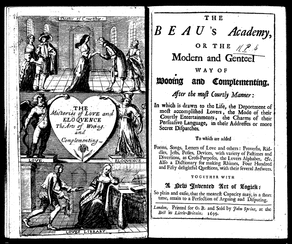 The beau's academy, 1699 Wing / 2854:35 In honor of the new year, I thought I'd offer some words of wisdom from the late 17th century. Granted, these words came from Edward Phillips, The beau's academy, or, The modern and genteel way of wooing and complementing after the most courtly manner (1699). So basically a book on how to be witty with the ladies. I selected a few of Phillips' -er- wisest statements and accompanying commentary (although a few are a tad hard to understand).
On prudent spending: He that spends beyond his ability, may hang himself with great agility. For he is lighter than he was by many a pound. (I have to say, this is one of Phillips' more sensical statements!) On the perils of whispering sweet nothings: Good words cost nothing. Unless it be love verses, for some men do pay. On fighting: He that cannot fight let him run. Tis a notable piece of Machiavelian policy. (I'm envisioning some poor battle-shocked Redcoats being relieved of their weapons and released to the elements....Machiavelian indeed!) On cooking: Better no pies, than pies made with scabby hands. (um, definitely one to keep in mind!) He's an ill cook that licks not his own fingers. (Methinks Tom Colicchio would concur!!!) On being a good provider: Good at meat, good at work. Therefore, 'tis the best way always to eat stoutly in the presence of women. (Got that, men?) ...and a few I can't easily categorize, but which sound a little naughty: Of idleness, comes no goodness. For that is the reason so many maids have the green sickness. (The "green sickness" [chlorosis or hypochromic anemia] was once considered "pecuilar to virgins." So being idle won't do anyone any good!) Hungry dogs love dirty puddings. There's many a man hath lost his nose by verifying this proverb. (I'll let someone else interpret this one!) Just a little something to ponder!!! |
Susanna CalkinsHistorian. Mystery writer. Researcher. Teacher. Occasional blogger. Categories
All
Archives
May 2023
|
 RSS Feed
RSS Feed